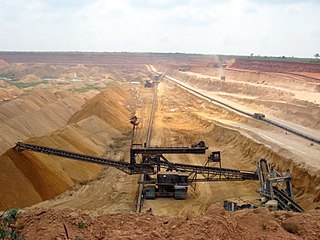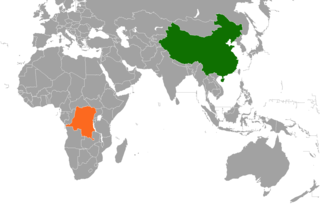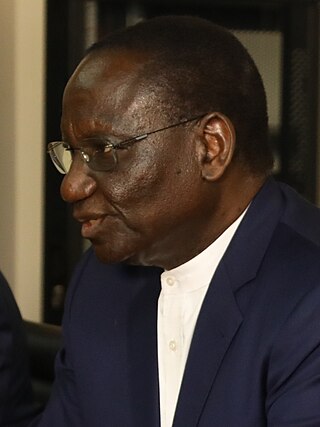Related Research Articles

The economy of the Democratic Republic of the Congo has declined drastically around the 1980s, despite being home to vast potential in natural resources and mineral wealth; their gross domestic product is $69.474 billion as of 2023. During the last five reported years the exports of Democratic Republic of the Congo have changed by $15.2B from $13.3B in 2017 to $28.5B in 2022.

The economy of Togo has struggled greatly. The International Monetary Fund (IMF) ranks it as the tenth poorest country in the world, with development undercut by political instability, lowered commodity prices, and external debts. While industry and services play a role, the economy is dependent on subsistence agriculture, with industrialization and regional banking suffering major setbacks.

Kinshasa, formerly named Léopoldville until 30 June 1966, is the capital and largest city of the Democratic Republic of the Congo. Once a site of fishing and trading villages along the Congo River, Kinshasa is now one of the world's fastest-growing megacities. Kinshasa's 2024 population was estimated at 17,032,322. It is the most densely populated city in the DRC, the most populous city in Africa, the world's fourth-most-populous capital city, Africa's third-largest metropolitan area, and the leading economic, political, and cultural center of the DRC. Kinshasa houses several industries, including manufacturing, telecommunications, banking, and entertainment. The city also hosts some of DRC's significant institutional buildings, such as the Palais du Peuple, Palais de la Nation, Court of Cassation, Constitutional Court, Cité de l'Union Africaine, Palais de Marbre, Stade des Martyrs, Immeuble du Gouvernement, Kinshasa Financial Center, and multiple federal departments and agencies.

The Democratic Republic of the Congo, also known as the DR Congo, the DRC, or Congo-Kinshasa, is a country in Central Africa. By land area the Congo is the second-largest country in Africa and the 11th-largest in the world. With a population of around 109 million, the Democratic Republic of the Congo is the most populous Francophone country in the world. The national capital and largest city is Kinshasa, which is also the economic center. The country is bordered by the Republic of the Congo, Central African Republic, South Sudan, Uganda, Rwanda, Burundi, Tanzania, Zambia, Angola, the Cabinda exclave of Angola, and the South Atlantic Ocean.

The Royal Museum for Central Africa (RMCA), communicating under the name AfricaMuseum since 2018, is an ethnography and natural history museum situated in Tervuren in Flemish Brabant, Belgium, just outside Brussels. It was originally built to showcase King Leopold II's Congo Free State in the International Exposition of 1897.
Mbuyamu Ilankir "Freddy" Matungulu (born January 4, 1955 Belgian Congo is a Congolese economist. He was Minister of Finance of the Democratic Republic of the Congo from 2001 to 2003.

Antoinette Monsio Sayeh is a Liberian economist and Deputy Managing Director of the International Monetary Fund (IMF). Sayeh served as the Director of the African Department at the IMF from July 14, 2008, to August 31, 2016. She also was a Distinguished Visiting Fellow at the Center for Global Development.

The mining industry of the Democratic Republic of the Congo produces copper, diamonds, tantalum, tin, gold, and more than 70% of global cobalt production. Minerals and petroleum are central to the DRC's economy, making up more than 95% of the value of its exports.

Moïse Katumbi Chapwe is a Congolese businessman and politician. He leads the Together for the Republic party. He was Governor of Katanga Province, located in the southern part of the Democratic Republic of the Congo, from 2007 to September 2015. He was a member of the People's Party for Reconstruction and Democracy (PPRD) until September 2015. He has been described by The Economist as "probably the second most powerful man in the Democratic Republic of Congo after the president, Joseph Kabila". Jeune Afrique named him "African of the Year" in 2015.

Trust Merchant Bank or TMB, is a commercial bank based in the Democratic Republic of Congo (DRC), with its headquarters located in Lubumbashi. The bank began operations in 2004. TMB operates in all sectors of the local banking market, including in retail banking, SME banking, corporate banking, and mobile banking.

The People's Republic of China (PRC) and the Democratic Republic of the Congo (DRC) have maintained diplomatic relations since 1961 and contacts between the two regions stretch back to 1887 when representatives of the Congo Free State established contacts with the court of the Qing dynasty. The first treaty between the two powers was signed in 1898.

Matata Ponyo Mapon is a Congolese political figure who was Prime Minister of the Democratic Republic of the Congo from 18 April 2012 to 17 November 2016. Previously he served as Minister of Finance from 21 February 2010 to 12 April 2012; as Prime Minister, he retained responsibility for the finance portfolio. He currently serves as Senator for Maniema.
Fatima Beyina-Moussa, born March 31, 1973, in Senegal, is a business leader and a prominent political figure deeply involved in the education sector. She is the Chairwoman of the African Foundation for Education (FAE) and was elected to the Brazzaville City Council in July 2022.
Rigobert Roger Andely, is a Congolese central banker and academic specializing in monetary and banking economics. He was Vice-Governor of the Bank of Central African States (BEAC) from 1998 to 2002, Minister of Finance in the government of Congo-Brazzaville from 2002 to 2005, and Vice-Governor of the BEAC again from 2005 to 2010.
The following lists events that happened during 2009 in the Democratic Republic of the Congo.

Noël Kabamba Tshiani Muadiamvita is a Congolese economist and politician. He was a presidential candidate in the 2018 and 2023 general elections. In 2021 and 2023, Tshiani proposed a law to restrict various government positions to only individuals who were born to Congolese parents.
Ingrid Ebouka-Babackas is a Congolese politician. She is Minister of Planning, Statistics and Regional Integration since May 7, 2016. She was previously Director General of National Financial Institutions at the Ministry of Economy, Finance, Budget and Public Portfolio.

Nicolas Kazadi is a Congolese politician and career diplomat who has been Ambassador-at-large for the Democratic Republic of the Congo since 7 March 2019 and Minister of Finance since 12 April 2021.
Jeanine Mabunda Lioko Mudiayi is a Congolese lawyer and politician who in 2019 became the first woman elected to lead the Democratic Republic of the Congo's National Assembly. She was impeached on December 10, 2020, through a democratic vote by the National Assembly with 281 votes.

Sylvestre Ilunga Ilunkamba is a Congolese politician who was appointed as the Prime Minister of the Democratic Republic of the Congo in May 2019, formally establishing his government in August 2019. He has had a long political career going back to the 1970s, having held a number of ministerial cabinet posts, and was previously a professor at the University of Kinshasa since 1979. Ilunga has also been the secretary general of Congo's national railway company. He has a reputation as an experienced public servant and technocrat, as well as an ally of former President Joseph Kabila.
References
- ↑ Stanis Bujakera, Aaron Ross and Sonya Hepinstall (5 July 2021). "Congo appoints IMF veteran Kabedi-Mbuyi to lead central bank". Reuters . Retrieved 3 June 2023.
- 1 2 3 Joël Té-Léssia Assoko (9 July 2021). "Five things to know about DRC's first female central bank governor". The Africa Report. Paris, France. Retrieved 3 June 2023.
- 1 2 3 4 Central Bank of the Congo (30 June 2021). "Profile of Malangu Kabedi Mbuyi, Governor of the Central Bank of the Congo" (Translated from the original French language). Central Bank of the Congo . Kinshasa, DR Congo. Retrieved 3 June 2023.